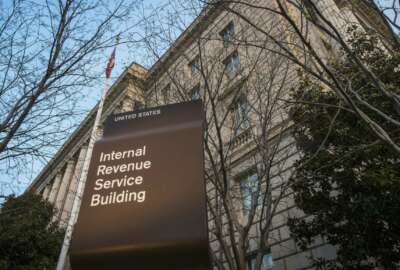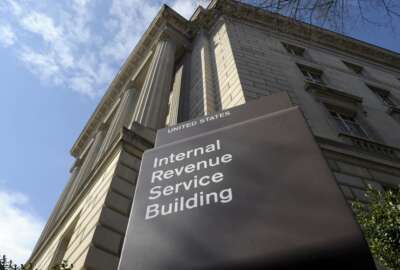
Taxpayer Advocate: IRS needs more FY18 funding to ‘beef up’ services, outreach and education for taxpayers
Internal Revenue Service watchdogs say the agency could do more in terms of taxpayer services if it had more human and financial resources. The White House proposed...
In 47 minutes, you could watch an episode of House of Cards, fly from Washington, D.C. to Philadelphia, or you could call the Internal Revenue Service compliance line and settle up a tax payment.
Forty-seven minutes was the average hold time for IRS’ compliance lines for the 2017 filing season, and only 40 percent of those calls were answered by customer service representatives, according to Taxpayer Advocate Nina Olson, during a May 23 house subcommittee hearing on IRS oversight.
That’s compared to 79 percent of accounts management answered calls, with 7-minute average wait times.
The inequality of those customer service options is just one example of why the IRS not only needs to be a taxpayer-first agency, but one that has enough money to serve those taxpayers — and with the White House proposing $10.9 billion for fiscal 2018, Olson suggested the agency prepare to do some convincing on Capitol Hill.
“The IRS remains significantly resource-constrained and there are limits to how much its performance can improve unless and until it receives additional funding,” Olson said. “Equally important is how IRS funding is allocated among its four accounts. I believe strongly that the IRS should be a taxpayer service-first agency. There is no doubt that enforcement plays an important role in determining non-compliance, but today the IRS spends 43 percent of its budget on direct enforcement activities, and more than 60 percent if operation support dollars that support enforcement are taken into account; as opposed to less than 4 percent on taxpayer outreach and education activities.”
Because the hearing was a rescheduled meeting on oversight from earlier in the month, neither Olson nor J. Russell George, the Treasury inspector general for tax administration, were prepared to talk in depth about agency funding. However, they both agreed IRS could be doing more if it had additional resources.
“I believe that the IRS needs to have the funds to beef up taxpayer service and outreach and education to taxpayers,” Olson said. “To build up its IT function and to do very research-based and targeted enforcement of compliance activities. It needs a budget that reflects those priorities in my opinion.”
“The IRS has been charged as of late both with the [Affordable Care Act], with doing much more work with much fewer resources,” George said. “I, too, have not had an opportunity to look at the president’s budget, but suffice it to say if the IRS had more resources, they could do more both for the American people as well as their overall mission of collecting revenue owed to the federal government.”
Doing what’s right
President Donald Trump’s budget, titled “A New Foundation for American Greatness,” set aside about $2.2 billion in total direct obligations for taxpayer services, which is about $87 million less than fiscal 2017. The White House proposed $4.7 billion for enforcement, which is a cut of about $183 million.
Nearly $4 billion has been set aside in IRS’ budget for operations support, which includes IT development. About $110 million has been earmarked for IT systems.
Frauds and scammers targeting IRS systems, along with taxpayer information and their dollars, was a topic that many of the House financial services and general government subcommittee members wanted answers to.
“Identify theft and fraud is something that we’re hearing more and more about, all of us are on both sides of the aisle, in Congress and our districts, in rural areas and in urban areas,” said Rep. David Young (R-Iowa). “You’ve heard about the ‘grandparents scam,’ the IRS impersonation scam, all these different kind of things. There’s a task force in Congress, it’s bipartisan, to prevent identity theft and fraud, and we learn about new ones every day and I’m sure you learn about new ones.”
Olson said she’d recently received a phone call at her house from someone claiming to be from the IRS informing her of a lawsuit unless she paid up.
George said scammers today are agile, and will adjust their attacks on taxpayers practically on a daily basis.
He said one area where his office will be keeping close watch — both for fraud and for compliance — is the private debt collection program that relaunched in April.
The IRS is contracting with four firms to collect on overdue tax accounts. The IRS will send written notice to each taxpayer and their representative that their account is being transferred to a PCA. The PCA will send a second letter confirming the transfer. The next step is a phone call from the private firm to the taxpayer.
Latest Management News
“Very concerning for us is the issue of authenticating debt collectors,” George said. “We found the true challenge is for years and years we’ve told people the IRS will not initiate a phone call to you because of the problem of telephone scam operators, and lo and behold this program is the private debt collectors initiating a phone call. It’s simply a matter of time before … the bad guys realize this and just adapt their policies and procedures in order to circumvent that change in policy.”
Rep. Jose Serrano (D-N.Y.) said the issue of IT security at the IRS is something that won’t go away, and security and privacy of taxpayers is something that should be a top priority for everyone when deciding on appropriations in the near future.
“I hope that we can all work together, to push it forward, not let it become a budget discussion, but rather a policy decision; that this committee pushes the IRS to do what is right,” Serrano said.
Meeting taxpayers’ needs
The Trump administration’s 2018 budget proposed roughly $1.5 billion for direct civilian full-time equivalent employment, compared to $1.6 billion in 2017. That would translate to a loss of approximately 4,000 FTEs.
“At what point do you believe the IRS would have sufficient resources both in terms of human as well as financial to meet the needs of taxpayers,” Rep. John Moolenaar (R-Mich.) asked Olson during the hearing.
“I don’t know what the right number is,” she said. “I more look at it like what are the skills that we’re missing and what do we have to build up. And my concern about IT is that in-house we don’t have the skilled employees … who can monitor what our contractors are doing in an informed way, and also do things themselves so that we don’t have to keep paying out to contractors over and over and over; that we internalize some of those skills. And I think we really have to get the IRS to submit a strategic plan about IT, painting a picture to Congress, particularly to the appropriators, what their plans are, where the gaps in their skill sets are, and that will drive the number. ”
Olson said in her opinion, more people are needed on the taxpayer service side and taxpayer facing side. Not just educating outward, but listening to taxpayers.
The IRS can make a case for additional funding, Olson said, by emphasizing the need to have more in-person services, rather than just driving users to web-based tools. According to her office’s research, there are about 33 million taxpayers who don’t have broadband internet access, and about 14 million taxpayers who don’t have any internet at all.
“A future state vision of an all-online IRS is definitely not going to meet their needs,” Olson said. “We need to recognize the taxpayer won’t be able to get online and that means they need phone and personal assistance, and the IRS needs to do those studies, work with [the Taxpayer Advocate Service], work with many of their federal advisory committees and other groups to make the case to you all, and give you the data so that you can make informed decisions about how to appropriate funds.”
Copyright © 2025 Federal News Network. All rights reserved. This website is not intended for users located within the European Economic Area.





